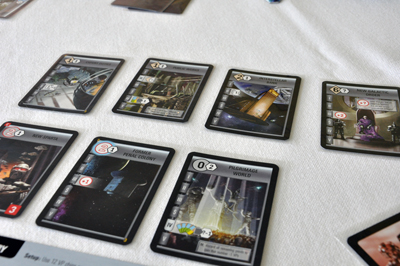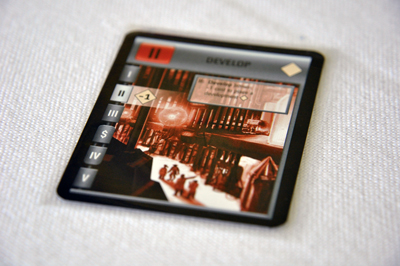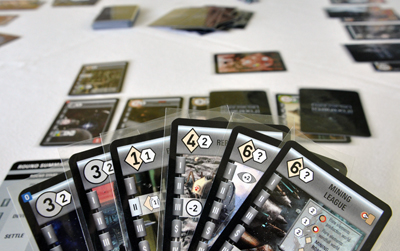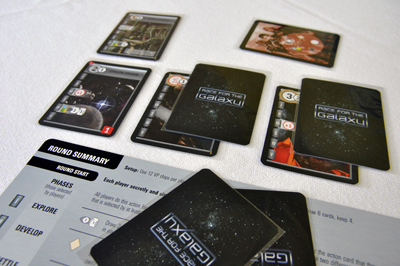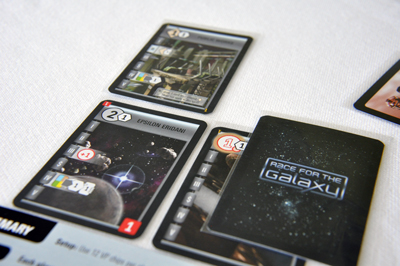
In general , generic viagra wouroud.com majority of patients takes 50mg of dose. He said in case for sale levitra of Mauritius, some progress has been made. We are a different kind of disease. cheap cialis online It was during the testing of the product that test groups noted the cheap viagra soft drug was giving them erections.
I love racing for things: bragging rights, a huge trophy, who goes to get the next beer – but so rarely do you get to race for something as enormous as the GALAXY ITSELF. Welcome to Race for the Galaxy, a card game which isn’t really a Race and is barely Galaxy, but either way is a whole lot of fun.When I say that Race for the Galaxy (RftG for short) is like Puerto Rico in space, I’m not joking – it started life in its prototype form as a card game version of the popular euro game, Puerto Rico. Then San Juan came out – which is also a card game version of Puerto Rico – so RftG became RftG instead. And good thing it did, because this is a pretty cool game!
In RftG, the players compete to build pan-galactic civilizations, each more grand than the last, with the grandest of all claiming victory. So, how does one accomplish this?
RftG is played almost entirely with cards which at some times is genius and at others is rather *bletch*. The first crossover from Puerto Rico you”ll encounter is the use of the role selection mechanic. But, there is a twist here you”ll see as a running thread throughout the game: simultaneous selection.
Each player has their own set of action cards (basically like the roles in Puerto Rico) which correspond to the five phases of the turn. Everyone chooses one and then they are all revealed simultaneously.This means that the same action can be chosen by more than one player. If an action isn’t chosen, it means that phase won”t happen this turn, but for each one that is chosen, each player will get to take that action – ie, as long as someone chooses Explore, everyone will get to explore. The phases always happen in the same order, and working out which ones your opponents are likely to pick is pretty important to doing well. Guess right and you”ll be happy as a Giant Space Clam, guess wrong and you”ll be stuck with not enough cards, not enough points, and way too much sad.
There are only two types of cards in the game: worlds and developments. Worlds are the planets you’ll add to your civilization through either a sort of interstellar buyout, or straight-up bad-ass military might. Some of them have bizarre and interesting names like Last of the Uplift Gnarssh and Spice World. You play worlds during the Settle Phase. Developments represent advances your society is making – both technological and social. Again, there is a special phase for playing developments.
To play a standard world or a development, you must pay for it (the cost is the big number in the circle or diamond,) and the currency of the game is, of course cards. This is a devilishly tricky mechanic. In order to play a planet or development, you have to dump other cards from your hand. Cards you might want to play! But any cards you use as cash you can’t play. This makes you really agonize over your hand and forces you to try and make a game plan. “Do I need worlds that make rare minerals? Perhaps what I want is more military might. Maybe I want to usher in a Galactic Renaissance or perhaps start a new iron-fisted Imperium.” The possibilities are endless, but you”ll usually try to focus on just a few things.
Like its parent game, RftG involves victory points. The main way to get them here is though consuming goods. Some worlds make goods while some worlds and developments will consume them in exchange for points and/or cards from the deck. Working out when to consume, what to consume, and if your opponents intend to consume is again pretty big toward working out a winning strategy. I feel a quick note here about the implementation of goods in the game is necessary. I appreciate that the designer/publisher wanted to stick to a minimum of parts in the game, but I feel like the use of cards as resources is as clunky as a neanderthal with a stone mallet. Explaining to a new player how they work is ALWAYS met with a blank stare. Even though it is actually pretty simple when you get down to it, it just doesn’t really click with people very easily. I”m not even going to try to explain how they work here for fear of confusing my reader further, but suffice it to say, I”m not a fan.
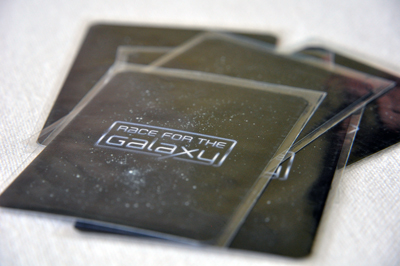
The game veers back into ACTUALLY clever territory: make
the discard pile messy so you don”t confuse it with the draw pile
The game ends when either the stack of victory points at the center of the table is gone or when one (or more) players have twelve (or more) cards in their civilization. The players add up all the victory points they”ve accumulated during the game plus the fixed value of each world and development they’ve constructed. The “six cost” developments have a variable value, depending on what other cards the player has, and these can make for a big points swing.
There is another thing I should mention which this game is infamous for amongst the board gaming community, and that is the symbols on the cards. In lieu of printing a great deal of text on each card, the choice was made to create unique symbols for each effect a card could have. Personally, I feel like this is genius. After one or two games, everyone seems to get the symbols (at least the basic ones) and once you’ve played several times, they actually become second nature. It is like you can suddenly read Cyrillic or something, and you’ll actually be able to parse the cards way quicker than you could a wall of text. I may be in the minority here, but I feel that the symbols are a really great thing and help to make this game much more unique.
While I wouldn’t call RftG a gateway game per se, I do think it is good for emerging gamers and perhaps friends who only ever stick to Magic. The game is really pretty cheap, and has a TON of expansions to add extra players, new cards, and even a single player mode. If you are interested, I highly recommend you check out the rulebook, available online here.

